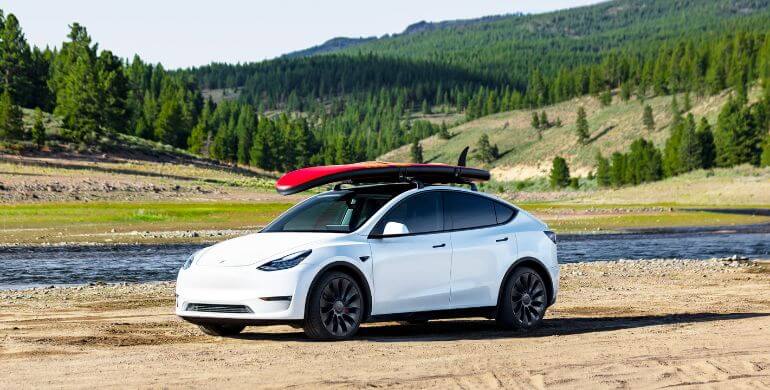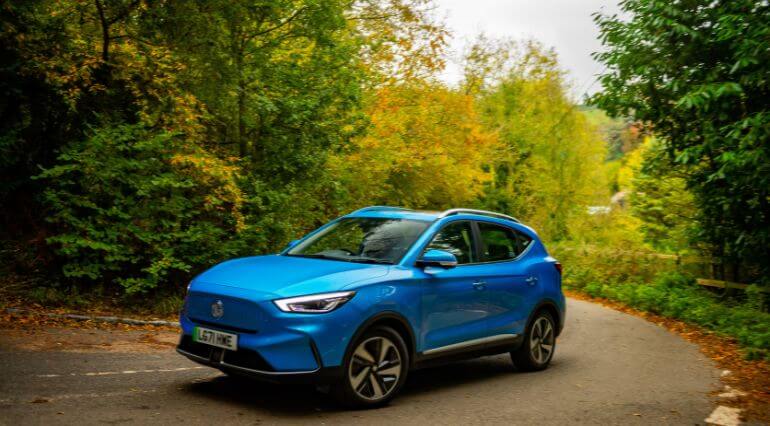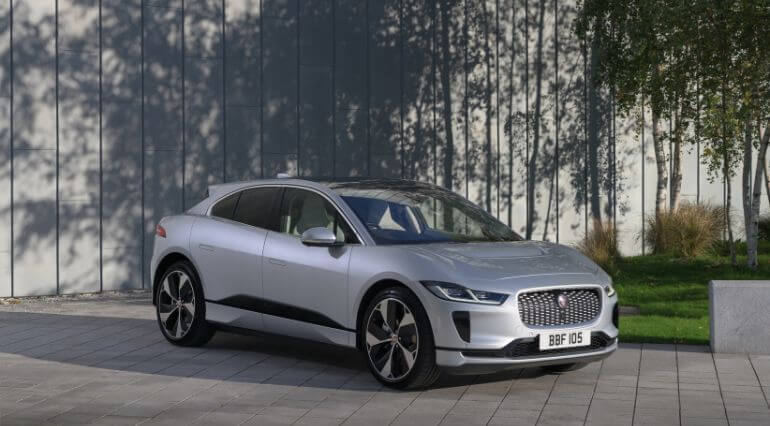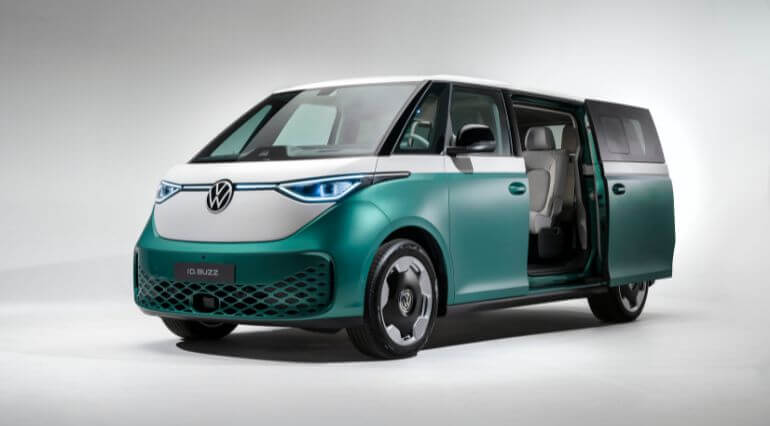Join the conversation
We love to hear from our customers. Connect with us today and let’s start a conversation.
...searching

With many new electric cars now achieving over 300 miles on a single charge, road-tripping an EV is no longer such a daunting prospect. But which one is best for when you want to get back in touch with nature?
It wasn’t so long ago that you would have been mocked for even suggesting taking an electric car on a camping trip. After all, range anxiety can be scary enough if you are on the dual carriageway 10 miles from home, but what would happen if you ran out juice in the middle of the wilderness? It’s not as if you could simply top-up your EV with a jerrycan.
Thankfully though, in the last few years battery technology has made great strides and charging infrastructure is steadily expanding into more remote locations. The net result: with proper planning you can now take your EV almost anywhere.
Moreover, in some ways an electric car is the perfect companion for a trip into the wild, as the lack of exhaust fumes and noise pollution help to preserve nature’s serenity.
With electric models ranging from £30-70,000, we count down our top five picks for EV camping.
5. MG ZS EV

Enter your registration and postcode and we’ll show you the best tyres for your EV
Kicking things off with a budget option is the MG ZS EV. But, despite the famous adage, you don’t always get what you pay for: sometimes you get a little extra too!
Starting from just £30,000, the ZS EV is one of the cheapest electric SUVs on sale. For that price you get a large 470l boot (perfect for a two-man tent and some supplies) and a capacious interior for its class. Or you can even fold the rear seats flat to achieve a cavernous 1,100l van-like cargo area.
Given the ZS sends its power exclusively to the front axle, it won’t trouble any Land Rovers when the going gets rough. However, throw a set of quality All season tyres on it and you will be able to make it down all but the worst camping trails thanks to a reasonable amount of ride height.
For those camping further afield, we’d also suggest opting for the slightly more expensive long-range variant which will achieve a handy 273 miles.
If you can put up with some slightly low-rent feeling cabin materials and a little less driving refinement than competitors, the ZS EV is a decent all-rounder for a retreat into the sticks.
4. Jaguar I-PACE

At the other end of the EV spectrum, Jaguar's I-PACE turns camping into glamping with its luxurious interior and driving experience. At £69,495 you’ll certainly pay for the privilege, but with the Jaguar you will enjoy the journey just as much as the camping holiday.
Touted as one of the finest driving EV SUVs in the world, the I-PACE belies its 2.2-ton kerb weight in the bends. Acceleration is also suitably rapid thanks to standard all-wheel drive and a combined 394hp; 0-60 is hit in just 4.8 seconds. When it comes to negotiating trickier terrains, that dual motor setup certainly won’t hurt either.
The I-PACE manages to combine this exceptional performance with a generous helping of practicality. An enormous 656l boot will easily swallow a week’s worth of provisions, while bags of interior space means that even 6ft-tall adults will have plenty of legroom on longer road trips.
However, disappointingly, despite costing twice as much as the MG, you only get another 20 or so miles of driving range. Still, 292 miles on a charge should be plenty for most trips. If your budget can stretch, the Jag is a great option.
3. VW ID. Buzz LWB

Ok, so the Buzz technically isn’t a car, but hear us out as this electric camper ticks all the other boxes.
As a modern-day reimagining of the much-adored type 2, it’s only natural that we include the Buzz on a list of EV alternatives. Nostalgic value aside though, the Buzz LWB is by far the most practical machine here.
In LWB guise you get a 7-seat electric microbus with sliding doors and an almost infinitely configurable interior. Need to carry more gear? Simply take out as many rear seats as you need at the pull of a lever. VW have even included nifty storage compartments named ‘Buzz Boxes’ to stop your valuables from sliding around the cabin.
Unsurprisingly the Buzz LWB won’t offer the same driving thrills on the way to camp as some contenders on this list, but it’s not going to feel like a chore either. Thanks to a more powerful battery pack than the base Buzz, you’ll see 62mph arrive in a brisk 7.9 seconds and a respectable 285 miles of range.
And, for those who can’t quite justify spending an (expected) £65,000, a regular 5-seat Buzz could be a nice alternative for around eight grand less.
If practicality is your priority, the Buzz is your best bet.
2. Hyundai Ioniq 5

Don’t be fooled by first impressions, this little hatchback is actually a not-so-little crossover. But that’s a good thing, as this extra size allows the Ioniq to be an incredible all-rounder.
Sitting a little higher than a regular hatch, the extra ground clearance means you’re unlikely to catch Hyundai's stylish bumpers when you leave asphalt for more rugged tracks. You probably won’t want to exit the tarmac though, as the Ioniq is a blast to drive too.
Top spec Ioniqs get seriously punchy 320hp four-wheel drive powertrains, but whichever model you go for, performance is more than ample. Plus, the most efficient model can achieve up to 315 miles on a charge – highly respectable given the £42,665 starting price.
It even has some camping experience on its resume, as TV show Fifth Gear showcased its versatility by taking one around Scotland’s picturesque North Coast 500-mile route.
1. Tesla Model Y

One of the things we love most about Tesla is their sheer breadth of abilities, and the Model Y is perhaps the epitome of this.
Team a colossal 854l of boot space to blistering sub-four second 0-60 mph performance, with up to 331 miles of range in Long Range form, and you have all the car you could ever need.
Unlike some of the EVs on this list, the Model Y has been specifically designed with camping holidays in mind. For example, the Tesla has a dedicated ‘Camping Mode’ which essentially turns the Y into a hub for your basecamp. This special power setting conserves the battery whilst allowing you to charge your handheld devices, play music and stream movies, and maintain a comfortable airflow and temperature.
If you’d rather ditch the tent entirely and pull your home behind you, the Model Y can even tow a 1600kg braked caravan – some 600kg more than the ID Buzz can manage.
It’s easy to see why the Model Y is our top pick, but do you think it’s worth the £10,000 premium (in Performance form) over the Ionic 5?
Once you’ve decided on which EV to go for, choosing the right kind of tyres is a must. If you live in a colder region, Michelin’s CrossClimate 2 is built for all seasons and offers a great balance of wet and dry grip. While those looking to reduce their EV’s tyre noise should look at Hankook’s iON Evo Sound Absorber. Or, to maximize range, Continental's ultra-efficient Eco Contact 6 is worth considering. Check out our vast selection of EV tyres today.
We love to hear from our customers. Connect with us today and let’s start a conversation.